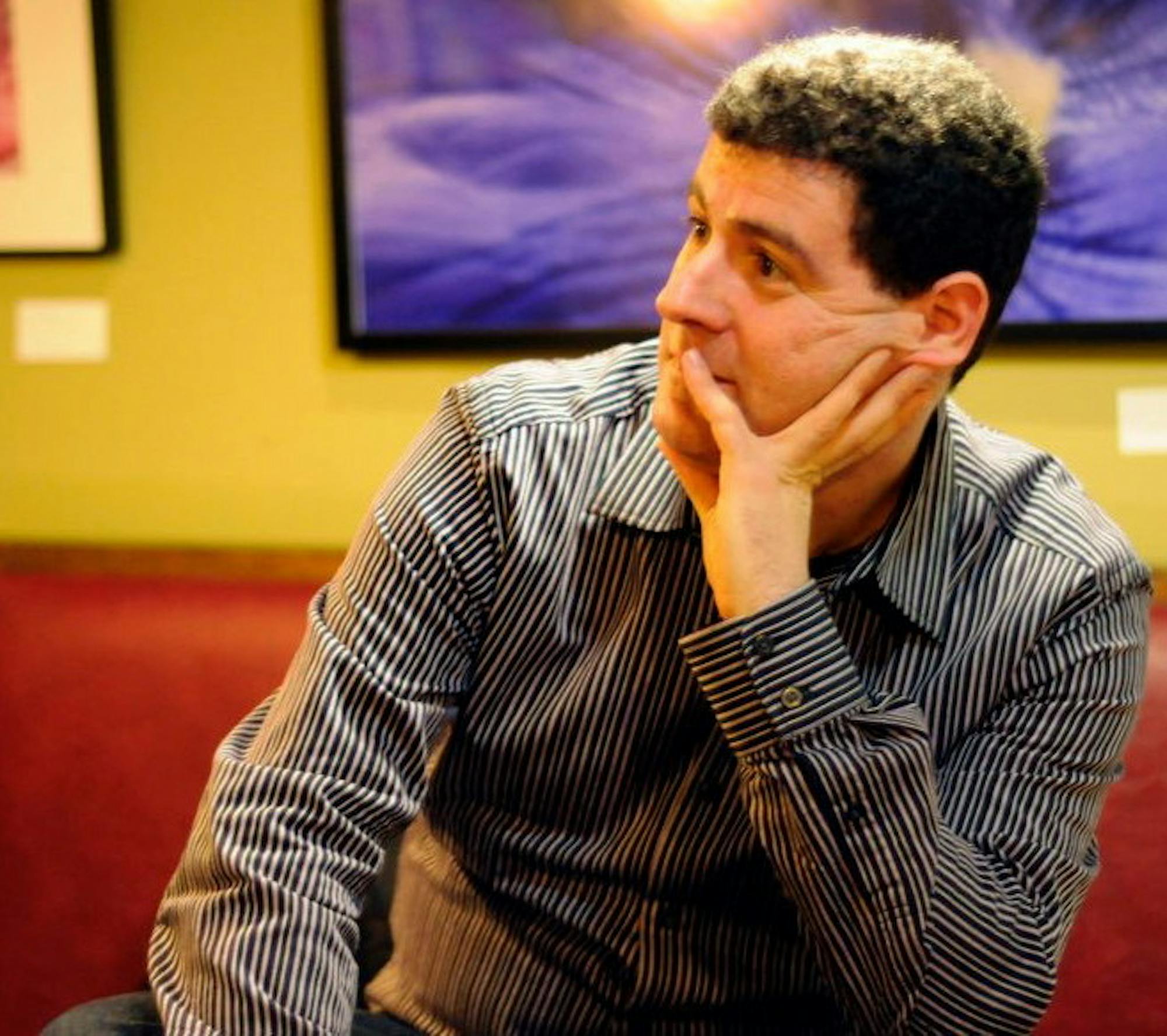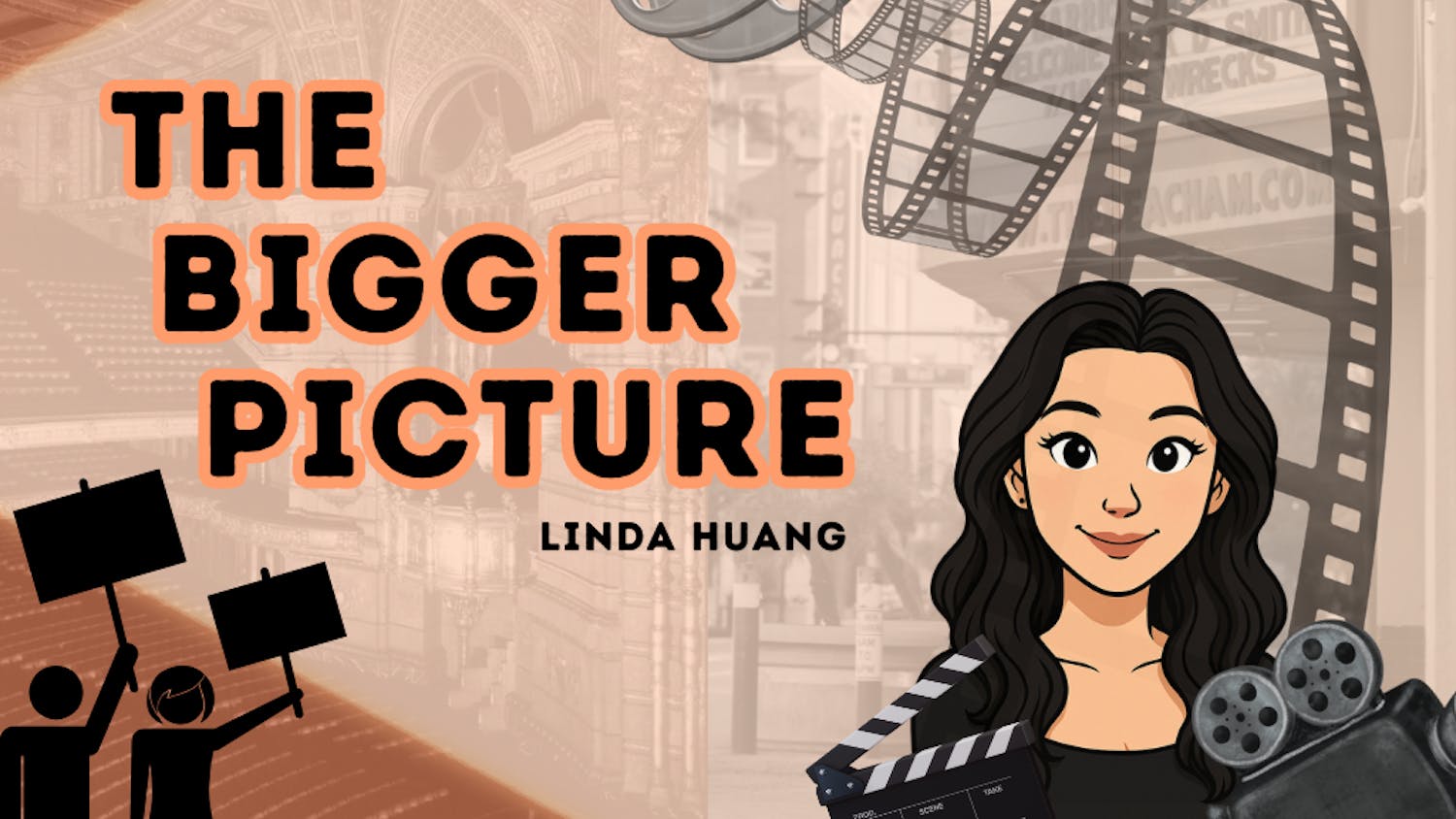“I find your National Pastime tactically unsound. Why would you throw away your weapon before running into hostile territory?” Gilad remarks to Issam, pondering the inexplicable nature of baseball. Gilad and Issam, the main characters of “Over Here” (first developed in 2003), a play by Tufts alumnus Meron Langsner, are good friends. While working at the same construction site, they tell jokes and bond over their shared experience as immigrants to the United States. In this way, their close companionship is normal, perhaps even to be expected. As an Israeli immigrant (Gilad) and a Palestinian American (Issam) living in New York City in 2002, their friendship, however, is not always so simple. The relationship is further complicated when Gilad hears that Issam’s distant cousin has perpetrated a suicide bombing in their shared homeland.
In development for more than 10 years, “Over Here” was produced in full for the first time this summer by Mortal Folly Theater company. Directed by Katherine Harte-DeCoux, the performance was part of the 2014 New York International Fringe Festival, a prestigious event including 200 shows selected from over 800 applications. Looking back on the decade of work he has dedicated to “Over Here,” and on the political changes -- domestic and international -- he has witnessed since first beginning the project, Langsner shared some of these reflections with the Daily.
9.11.2001
Langsner, a resident of NYC in 2001, said “Over Here” was first developed in response to his personal experience of the terrorist attacks of 9/11.
“The world trade center was my subway stop at the time the attacks happened ... when I got out of my train, there was a wall of screaming people coming straight at me,” he said, describing the day. As a result Langsner, like many New Yorkers, developed Post-Traumatic Stress Disorder (PTSD) in his continuing struggle to understand the political realities of the present. It was a trauma which would soon be reflected in his professional and personal lives.
“Some of what I was writing in the couple years after [9/11] was me processing the experience of being in the New York City attacks and being in the New York City aftermath of the attacks ... when there were constant bomb scares, when work was harder to get, when you were seeing a lot of people who were going through PTSD in various forms,” he said. Though his earliest writing was a documentary drama, “like journalism on stage” Langsner said, he soon began to work on the dramatic project that would become “Over Here.”
Langsner stressed that, while "Over Here" was instigated by his visceral reaction to 9/11, the play is separate from his unfiltered experience. "Art is very much emotion processed through intellect and instinct," he explained.
“With a play like ‘Over Here,’ by the time it gets to stage ... it’s been processed enough, because most good art is not raw emotion. Raw emotion is hardly [interesting] on stage,” Langsner said.
A Work under Construction
“Over Here” has grown through the years, having been read and workshopped many times. Since it was first written -- Langsner was working toward his MFA in playwriting from Brandeis University at the time -- “Over Here” has won awards and earned praise. Yet in 2003, the playwright was far from satisfied. As a doctoral student in drama at Tufts (he earned his Ph.D. in 2011), Langsner got partial funding from the university to take the play to Valdez, Alaska as part of the Last Frontier Theatre Conference.
This opportunity, and others, were part of a long journey that crafted “Over Here,” shaping it from the early story written a mere two years after 9/11 to the product of countless hours that premiered at the New York International Fringe Festival on Wednesday, Aug. 13th of this year. After so many years of work, Langsner met the news that “Over Here” would be produced with excitement and even surprise.
New York International Fringe Festival
The play was performed in its current form for the first time this past August -- twelve years after the play is set. Both periods mark turbulent times in the Middle East. While these events make “Over Here” incredibly relevant to today’s audiences, Langsner expressed regret for this parallel.
“I hated that it was as timely as it was -- I had hoped it was a period piece,” he said. “I wish we were closer to a peaceful solution.”
It is one of many disappointments Langsner, a proponent of a two-state solution, feels in regard to the conflict in Israel / Palestine.
“The Israeli view of the conflict, and the Palestinian view of the conflict, is much more multi-faceted then we are lead to believe," he said. "I think there’s a lack of sophistication in the portrayal [of the conflict in American media and drama]."
According to Langsner, many of the people currently writing and producing theater who are concerned with the Palestinian-Israeli conflict are prone to political oversimplification and repeated party lines.
As someone who feels he has a personal stake in the issue, Langsner is particularly frustrated by continued violence in the Middle East and the media coverage of the conflict.
“I’m Israeli-American. Anything that happens in the Middle East is deeply personal to me. If a rocket falls on Israel, it’s falling near my family,” he said.
Given his connection to the area, Langsner spoke to the emotional complexity that involves consuming media coverage of -- and feeling personally invested in -- both domestic and foreign acts of terrorism, a difficult position he shares with Issam and Gilad.
Theater and Trauma
“Over Here,” an important reflection of Langsner’s personal understanding of the 9/11 attacks, may also be applicable to others, as it deals with events and politics that have touched and altered so many American and international communities. As a piece of dramatic art, “Over Here” aims to become part of the healing process in the aftermath of 9/11 and as the Israeli-Palestinian conflict continues.
For his part, Langsner was divided about the usefulness of drama in dealing with tragedy, or a play’s ability to bring together two sides with seemingly irreconcilable differences. Surprisingly, given his profession, he admitted to feeling conflicted about the use of charitable funds, such as those distributed by Indiegogo, an international crowdfunding website, and an organization which actually helped to raise money for the development of “Over Here.”
“Why would you fund a play when you can fund a hospital?" he said. "It makes the play in some ways feel very trivial, but then it feels very important, because it’s putting a human face on what would otherwise be statistics in the news.”
This is not to imply, however, that Langsner questions the value of dramatic art generally. On the contrary, he articulated a strong belief in the power of modern theater to bring public awareness to those issues often (perilously) ignored.
“[Drama’s] putting humanity in perspective," he said. "We’ve seen [in recent decades] where the first mention of AIDS in the New York Times was in the theater section and many people’s first exposure to certain ideas have been through the arts."
What’s Next?
Though there are currently no definite plans for a second production of “Over Here,” Langsner has a good idea about the immediate future of his career. Currently, he is working on a workshop reading of a play called “The Devil's Own Game,” which he described as “a re-imagining of the Faust myth ... very much about the ethics of knowledge and power.”
Langsner remains engaged with news of the Middle East and with the continuous change and violence taking place there. Does he feel more hope for the next ten years than the last? His answer is neither overly hopeful, nor fatalistic, but plainly honest.
“There’s days when there’s hope, and there’s days when I hate the world when I think about it," he said. "There are days when I think, you know, we’ll all get along and everything will be fine, and there’s days when I don’t see an end to it."
'Over Here' explores friendship after 9/11, conflict in the Middle East

Langsner feels a personal connection with the Middle East and an investment in the conflict there that has influenced his work.





